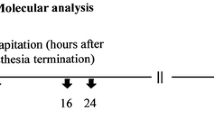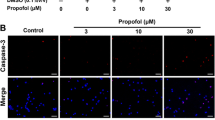Abstract
Propofol is currently one of the most widely used intravenous anesthetics and has been indicated to induce cognitive dysfunction in adults. Here, we investigated the effects of propofol exposure during early postnatal life on hippocampal neurogenesis. Propofol (30 or 60 mg/kg) was administered to mice on either postnatal day (P) 7 or P7–P9; cell proliferation and neurogenesis in the dentate gyrus (DG) were evaluated on P8 or P17. It showed that exposure to propofol on P7 decreased hippocampal cell proliferation as indicated by BrdU and Sox2 immunostaining at P8 in propofol treatment at the dosage of 60 mg/kg but not at the dosage of 30 mg/kg. Western blots revealed propofol treatment decreased Akt or extracellular signal-related kinase (ERK) 1/2 phosphorylation in the hippocampus at P8. Propofol treatment on P7 to P9 reduced the numbers of newly formed neurons in the DG at P17, which was accompanied by delay of granule neuron maturation and decreased the density of dendritic spines, particularly the mushroom-shaped mature spines. Furthermore, the in vitro findings indicated propofol suppressed cell proliferation and cell mitosis and activated apoptosis of C17.2 neural stem cell line in a dose-dependent manner. These findings suggest that propofol impairs cell proliferation and inhibits neurogenesis in the immature mouse brain and thus is possibly involved in the cognitive dysfunction induced by propofol anesthesia.










Similar content being viewed by others
References
Istaphanous GK, Loepke AW (2009) General anesthetics and the developing brain. Curr Opin Anesthesiol 22(3):368–373
McCann ME, Soriano SG (2012) General anesthetics in pediatric anesthesia: influences on the developing brain. Curr Drug Targets 13(7):944–951
Reddy SV (2012) Effect of general anesthetics on the developing brain. J Anaesthesiol Clin Pharmacol 28(1):6–10
Jevtovic-Todorovic V, Hartman RE, Izumi Y, Benshoff ND, Dikranian K, Zorumski CF, Olney JW, Wozniak DF (2003) Early exposure to common anesthetic agents causes widespread neurodegeneration in the developing rat brain and persistent learning deficits. J Neurosc: Off J Soc Neurosci 23(3):876–882
Cattano D, Young C, Straiko MM, Olney JW (2008) Subanesthetic doses of propofol induce neuroapoptosis in the infant mouse brain. Anesth Analg 106(6):1712–1714
Fredriksson A, Ponten E, Gordh T, Eriksson P (2007) Neonatal exposure to a combination of N-methyl-D-aspartate and gamma-aminobutyric acid type A receptor anesthetic agents potentiates apoptotic neurodegeneration and persistent behavioral deficits. Anesthesiology 107(3):427–436
Ikonomidou C (1999) Blockade of NMDA receptors and apoptotic neurodegeneration in the developing brain. Science 283(5398):70–74
Satomoto M, Satoh Y, Terui K, Miyao H, Takishima K, Ito M, Imaki J (2009) Neonatal exposure to sevoflurane induces abnormal social behaviors and deficits in fear conditioning in mice. Anesthesiology 110(3):628–637
Yu D, Jiang Y, Gao J, Liu B, Chen P (2013) Repeated exposure to propofol potentiates neuroapoptosis and long-term behavioral deficits in neonatal rats. Neurosci Lett 534:41–46
Wilder RT, Flick RP, Sprung J, Katusic SK, Barbaresi WJ, Mickelson C, Gleich SJ, Schroeder DR, Weaver AL, Warner DO (2009) Early exposure to anesthesia and learning disabilities in a population-based birth cohort. Anesthesiology 110(4):796–804
Franks NP, Lieb WR (1994) Molecular and cellular mechanisms of general anaesthesia. Nature 367(6464):607–614
Hudson AE, Hemmings HC Jr (2011) Are anaesthetics toxic to the brain? Br J Anaesth 107(1):30–37
Irifune M, Takarada T, Shimizu Y, Endo C, Katayama S, Dohi T, Kawahara M (2003) Propofol-induced anesthesia in mice is mediated by gamma-aminobutyric acid-A and excitatory amino acid receptors. Anesth Analg 97(2):424–429, table of contents
Harris KM, Jensen FE, Tsao B (1992) Three-dimensional structure of dendritic spines and synapses in rat hippocampus (CA1) at postnatal day 15 and adult ages: implications for the maturation of synaptic physiology and long-term potentiation. J Neurosc: Off J Soc Neurosci 12(7):2685–2705
Stratmann G (2011) Review article: neurotoxicity of anesthetic drugs in the developing brain. Anesth Analg 113(5):1170–1179
Vutskits L (2012) Anesthetic-related neurotoxicity and the developing brain: shall we change practice? Paediatric Drugs 14(1):13–21
Ming GL, Song H (2005) Adult neurogenesis in the mammalian central nervous system. Annu Rev Neurosci 28:223–250
Deng W, Aimone JB, Gage FH (2010) New neurons and new memories: how does adult hippocampal neurogenesis affect learning and memory? Nat Rev Neurosci 11(5):339–350
Eichenbaum H (2004) Hippocampus: cognitive processes and neural representations that underlie declarative memory. Neuron 44(1):109–120
Winocur G, Wojtowicz JM, Sekeres M, Snyder JS, Wang S (2006) Inhibition of neurogenesis interferes with hippocampus-dependent memory function. Hippocampus 16(3):296–304
Erasso DM, Camporesi EM, Mangar D, Saporta S (2013) Effects of isoflurane or propofol on postnatal hippocampal neurogenesis in young and aged rats. Brain Res 1530:1–12
Erasso DM, Chaparro RE, del Rio CEQ, Karlnoski R, Camporesi EM, Saporta S (2012) Quantitative assessment of new cell proliferation in the dentate gyrus and learning after isoflurane or propofol anesthesia in young and aged rats. Brain Res 1441:38–46
Thal SC, Timaru-Kast R, Wilde F, Merk P, Johnson F, Frauenknecht K, Sebastiani A, Sommer C, Staib-Lasarzik I, Werner C (2014) Propofol impairs neurogenesis and neurological recovery and increases mortality rate in adult rats after traumatic brain injury. Crit Care Med 42(1):129–141
Krzisch M, Sultan S, Sandell J, Demeter K, Vutskits L, Toni N (2013) Propofol anesthesia impairs the maturation and survival of adult-born hippocampal neurons. Anesthesiology 118(3):602–610
Sall JW, Stratmann G, Leong J, Woodward E, Bickler PE (2012) Propofol at clinically relevant concentrations increases neuronal differentiation but is not toxic to hippocampal neural precursor cells in vitro. Anesthesiology 117(5):1080–1090
Popic J, Pesic V, Milanovic D, Todorovic S, Kanazir S, Jevtovic-Todorovic V, Ruzdijic S (2012) Propofol-induced changes in neurotrophic signaling in the developing nervous system in vivo. PLoS One 7(4):e34396
Whittington RA, Virag L, Marcouiller F, Papon MA, El Khoury NB, Julien C, Morin F, Emala CW, Planel E (2011) Propofol directly increases tau phosphorylation. PLoS One 6(1):e16648
Li DB, Tang J, Xu HW, Fan XT, Bai Y, Yang L (2008) Decreased hippocampal cell proliferation correlates with increased expression of BMP4 in the APPswe/PS1DeltaE9 mouse model of Alzheimer’s disease. Hippocampus 18(7): 692–698
Gao X, Deng P, Xu ZC, Chen J (2011) Moderate traumatic brain injury causes acute dendritic and synaptic degeneration in the hippocampal dentate gyrus. PLoS One 6(9):e24566
Yau SY, Lau BW, Tong JB, Wong R, Ching YP, Qiu G, Tang SW, Lee TM, So KF (2011) Hippocampal neurogenesis and dendritic plasticity support running-improved spatial learning and depression-like behaviour in stressed rats. PLoS One 6(9):e24263
Wang SJ, Weng CH, Xu HW, Zhao CJ, Yin ZQ (2014) Effect of optogenetic stimulus on the proliferation and cell cycle progression of neural stem cells. J membr Biol 247(6):493–500
Snyder EY, Deitcher DL, Walsh C, Arnold-Aldea S, Hartwieg EA, Cepko CL (1992) Multipotent neural cell lines can engraft and participate in development of mouse cerebellum. Cell 68(1):33–51
Chen X, Li QY, Xu HW, Yin ZQ (2014) Sodium iodate influences the apoptosis, proliferation and differentiation potential of radial glial cells in vitro. Cell Physiol Biochem 34(4):1109–1124
Fan XT, Xu HW, Cai WQ, Yang H, Liu S (2004) Antisense Noggin oligodeoxynucleotide administration decreases cell proliferation in the dentate gyrus of adult rats. Neurosci Lett 366(1):107–111
Mullen RJ, Buck CR, Smith AM (1992) NeuN, a neuronal specific nuclear protein in vertebrates. Development 116(1):201–211
Snyder JS, Hong NS, McDonald RJ, Wojtowicz JM (2005) A role for adult neurogenesis in spatial long-term memory. Neuroscience 130(4):843–852
Kuhn HG, Dickinson-Anson H, Gage FH (1996) Neurogenesis in the dentate gyrus of the adult rat: age-related decrease of neuronal progenitor proliferation. J Neurosc: Off J Soc Neurosci 16(6):2027–2033
Pevny LH, Nicolis SK (2010) Sox2 roles in neural stem cells. Int J Biochem Cell Biol 42(3):421–424
Bonaguidi MA, Wheeler MA, Shapiro JS, Stadel RP, Sun GJ, Ming GL, Song H (2011) In vivo clonal analysis reveals self-renewing and multipotent adult neural stem cell characteristics. Cell 145(7):1142–1155
Feng R, Zhou S, Liu Y, Song D, Luan Z, Dai X, Li Y, Tang N, Wen J, Li L (2013) Sox2 protects neural stem cells from apoptosis via up-regulating survivin expression. Biochem J 450(3):459–468
Wang H, Luo M, Li C, Wang G (2011) Propofol post-conditioning induced long-term neuroprotection and reduced internalization of AMPAR GluR2 subunit in a rat model of focal cerebral ischemia/reperfusion. J Neurochem 119(1):210–219
Peters A, Kaiserman-Abramof IR (1970) The small pyramidal neuron of the rat cerebral cortex. The perikaryon, dendrites and spines. Am J Anat 127(4):321–355
Acknowledgments
This study was supported by the National Nature Science Foundation of China (No. 81371197) and the Natural Science Foundation Project of CQ CSTC 2013jjB10028.
Author information
Authors and Affiliations
Corresponding authors
Additional information
Jing Huang and Sheng Jing contributed equally to this work.
Rights and permissions
About this article
Cite this article
Huang, J., Jing, S., Chen, X. et al. Propofol Administration During Early Postnatal Life Suppresses Hippocampal Neurogenesis. Mol Neurobiol 53, 1031–1044 (2016). https://doi.org/10.1007/s12035-014-9052-7
Received:
Accepted:
Published:
Issue Date:
DOI: https://doi.org/10.1007/s12035-014-9052-7




